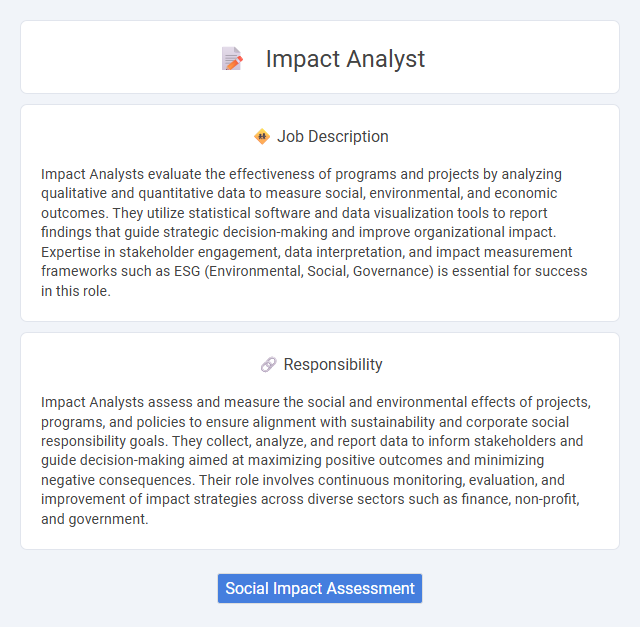
Impact Analysts evaluate the effectiveness of programs and projects by analyzing qualitative and quantitative data to measure social, environmental, and economic outcomes. They utilize statistical software and data visualization tools to report findings that guide strategic decision-making and improve organizational impact. Expertise in stakeholder engagement, data interpretation, and impact measurement frameworks such as ESG (Environmental, Social, Governance) is essential for success in this role.
People who thrive as Impact Analysts likely have strong analytical skills and a genuine interest in measuring social and environmental outcomes. Individuals comfortable with data interpretation, critical thinking, and collaborative problem-solving probably find this role suitable. Those who prefer routine tasks or lack patience for complex, evolving impact assessments may find it challenging to succeed in this position.
Qualification
Impact Analysts require strong analytical skills and proficiency in data analysis tools such as Excel, SQL, and statistical software like R or Python. A bachelor's degree in economics, environmental science, social sciences, or related fields is typically essential, with many employers preferring candidates with advanced degrees or certifications in sustainability or impact measurement. Experience in conducting impact assessments, familiarity with ESG (Environmental, Social, and Governance) criteria, and the ability to translate complex data into actionable insights are critical qualifications for success in this role.
Responsibility
Impact Analysts assess and measure the social and environmental effects of projects, programs, and policies to ensure alignment with sustainability and corporate social responsibility goals. They collect, analyze, and report data to inform stakeholders and guide decision-making aimed at maximizing positive outcomes and minimizing negative consequences. Their role involves continuous monitoring, evaluation, and improvement of impact strategies across diverse sectors such as finance, non-profit, and government.
Benefit
Impact Analysts likely provide organizations with valuable insights on social and environmental outcomes, enhancing decision-making processes. Their work probably helps in identifying areas where projects can deliver greater positive change, increasing overall effectiveness. Companies employing Impact Analysts may experience improved stakeholder trust and better alignment with sustainability goals.
Challenge
The Impact Analyst role likely presents challenges in interpreting complex data sets to identify meaningful trends and outcomes. Analyzing the social, environmental, or financial impacts of projects may require overcoming uncertainties and balancing qualitative insights with quantitative metrics. Navigating stakeholder expectations while ensuring accurate and actionable evaluations could also be a significant aspect of the job's difficulty.
Career Advancement
Impact Analyst roles provide a strategic foundation for professionals aiming to excel in data-driven decision-making and sustainability consulting. Mastery of analytics tools, impact measurement frameworks, and stakeholder engagement propels career advancement into senior analyst, project manager, or sustainability officer positions. Continuous skill development in impact evaluation and reporting enhances opportunities for leadership roles within corporate social responsibility and environmental, social, and governance (ESG) domains.
Key Terms
Social Impact Assessment
Impact Analysts conduct Social Impact Assessments to evaluate the effects of projects on communities, focusing on factors such as health, education, and local economies. They use qualitative and quantitative methods to collect data, identify risks, and propose mitigation strategies that promote sustainable development. Their work supports decision-making processes to ensure projects align with social responsibility goals and regulatory requirements.
 kuljobs.com
kuljobs.com